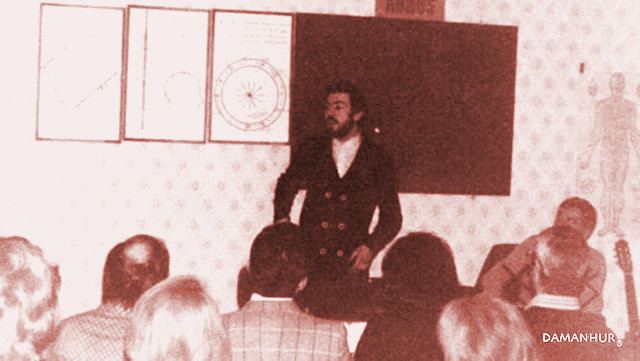The value and the necessity of secrecy
When he appeared on the scenes of esoteric Turin in the beginning of the seventies of the last century, Falco Tarassaco caused many esotericists to turn up their noses. The city of Turin, around which Damanhur has developed, has always been a city very attentive to all that is mysterious, occult, paranormal and magical. Turin, even today which is an Olympic metropolis, multiethnic and open to a thousand cultures, is by vocation an extremely reserved, inconspicuous city of few words, and “esoteric” by character. Together with Lyon and Prague it is considered one of the vertices of the triangle of white magic, while with London and San Francisco it composes the triangle of black magic.

True? False? What is certain is that the city has always hosted many research and study circles linked to the different aspects of esoterism. When Falco began to speak publicly about his vision of life, magic and esoterism he aroused much irritation in these circles, which were based on the secret: of certain subjects that one should not speak!
Falco, however, from the beginning, held that every secret can be revealed, any knowledge can be shared, because it must not represent a way to exercise a power, but if anything, a way to unite people. Therefore, he spoke of the rituality of laws of magic, divine pantheons, the Grail, the Shroud, and magical objects, with the naturalness and simplicity that were his own and which became proverbial.

Damanhur and his School of Meditation developed, then just as now, on the premise of sharing an esoteric and spiritual culture, in the broadest sense of these terms, stripping them of the mysterious and secret aspects. This, as mentioned, was not enough to create many friends, especially among those who believed themselves to be holders of great knowledge, but allowed many people to approach topics that had been considered for only a few.
Topics for questioning
The problem is often that of trivializing and not understanding the depth of the themes that make up traditional knowledge. One can not speak of Divinity, of Mother Worlds, of Portals to other dimensions, with the same nonchalance with which we speak of football, cooking or tv shows. You can not even do it simply for conversation, perhaps respectfully but purely theoretically. These are topics that by their nature involve people, give rise to their reflections and the need to learn more … unless, of course, to animate a cultural salon, in which to show their deep preparation and arouse admiration.
From this point of view esoterism is still needed. Not to keep the secret on certain topics, but to teach people to measure things through reflection on themselves: do not ask yourself “what is a Spirit of nature” but ask “what would change in me if I could get in touch with a spirit of nature?”

Esoterism according to Damanhur is not a set of secret topics, as the classical esotericists say; it is a set of topics that can be dealt with as long as they are questioning themselves, with the willingness to be explored to modify our own points of view on life.
And the mystery?
Esoterism must not even be confused simply with “what we do not know”. It is a way of approaching the topics by being reserved, not because you love secrets, but because you want to get closer to important issues with the awareness that these are subjects that change people.
“What we do not know”, that we may have yet to discover, is the challenge to realize how many aspects of life are still unknown to us, and this is part of the attention that we have to bring to things. The wish of the Damanhurians is that there is always a part of the unknown to be discovered, both near and far from us. And that there is not always someone who already knows it, to reveal it, but that we can discover it ourselves. Esoterism is a mystery that must still be discovered.
Discovering it means understanding it!







